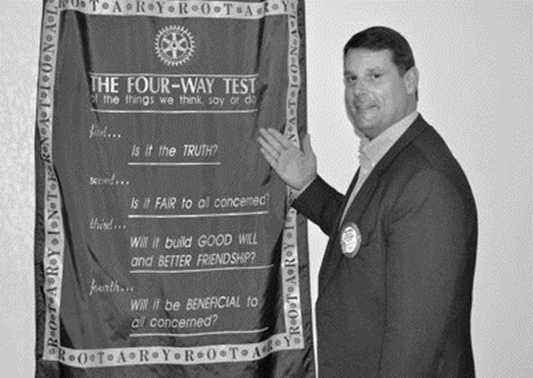Origin of Rotary's Four Way Test
Ever wonder about the origin of Rotary's Four Way Test? Read on to find out
MATTHEW BROWN, a local businessman and member of the Cleveland Rotary Club, calls the club’s attention to its Four-way Test. Submitted photo
The guidelines that worked to turn around a failing company during the years of the Great Depression serve today as the moral compass of the world’s largest service club organization, Rotary International.
“The Four-Way Test of the things we think, say or do,” a protocol used by members of Rotary Clubs around the world as a nonpartisan and nonsectarian ethical code for personal and business relationships, will be emphasized by local clubs during the month of November. The test was scripted by a Chicago businessman and Rotary Club member, Herbert J. Taylor, during the depths of the Depression as he set out to save the Club Aluminum Products Distribution Company from bankruptcy.
When he shared it with his employees, it was eagerly adopted. It became the watchword of the company, which successfully avoided financial collapse and rebounded to become a profitable enterprise.
The 24 words of the test are recited as follows:
“Is it the truth?
“Is it fair to all concerned?
“Will it build goodwill and better friendships?
“Will it be beneficial to all concerned?”
Taylor shared the test with his Rotary colleagues, and it was eventually adopted in 1940 by Rotary International, the global service club organization, and continues to be used by Rotarians. Most clubs — like Cleveland Rotary, which meets at the Mountain View Inn at noon each Tuesday — proudly display the familiar text on a prominent banner. Other Rotary groups observe the practice of together repeating the test at each meeting.
Matthew Brown, a Cleveland businessman and Rotarian, explained that the Four-Way Test can be applied to almost any aspect of life.
“When men and women become members of a local Rotary Club, they are asked to use the test in their personal lives and business conduct,” he said. “Stories are sometimes shared by Rotarians about how the 24 words have helped them determine direction or make a critical business decision.”
Rotary exists in Cleveland in five clubs, including Cleveland Rotary, Bradley Sunrise Rotary, and the Cleveland High, Bradley High, and Cleveland Middle School Interact clubs. The service projects of the clubs are gathered into five areas: Club, Community, Vocational, International and Youth Service. The grassroots organizations focus on six principal areas: promoting peace, fighting disease, providing clean water, saving mothers and children, supporting education, and improving local economies.
The five local clubs donate time, labor and funds to various Cleveland-area nonprofits including the Boys & Girls Clubs, Habitat for Humanity, and numerous other organizations that receive annual grants.

